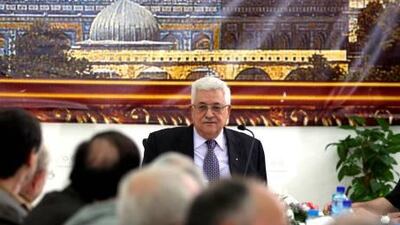JERUSALEM // Palestinian officials yesterday urged an end to direct negotiations with Israel if construction on Jewish settlements is allowed to continue.
Speaking immediately after a gathering of the Palestine Liberation Organisation's (PLO) executive committee in Ramallah, its spokesman Nabil Abu Rdainah said there "will be no negotiations in the shadow of continued settlement" construction.
Now, with firm PLO backing, Mahmoud Abbas, the Palestinian Authority president, has less than a week of diplomacy left before meeting on Friday with Arab League officials in Libya. He has said the Palestinian leadership would make its final decision on the talks at that meeting. Yesterday's PLO meeting was held to decide whether the Palestinian leadership would agree to suspend its participation in the month-old talks, which were thrown into limbo last week when a partial freeze on Jewish settlement construction was lifted.
The PLO said it "holds Israel responsible for obstructing the negotiations" and that the Palestinian leadership had "alternatives" to the negotiations. No details were provided. The decision did not come as a surprise. Just before yesterday's meeting, PLO officials said they had already made up their minds. The agreement not to budge on the issue of settlement construction was probably helped by intransigent statements made on Friday by Israel's prime minister, Benjamin Netanyahu, who blamed the impasse on the Palestinians.
"For 17 years they negotiated with the Israeli government during settlement construction, including the last year of the former government," Mr Netanyahu said in discussions with his advisers. "Everyone knows that restrained and moderate construction in [the West Bank] in the next year will not even affect the peace process." Mr Netanyahu said the international community "needs to call on the Palestinians to continue engaging in peace talks", as George Mitchell, the US special envoy to the Middle East, and Catherine Ashton, the European Union's foreign policy head, were travelling between Jerusalem and Ramallah to find a compromise.
After a brief stopover in Qatar, Mr Mitchell arrived in Cairo yesterday on his regional tour to revive the faltering talks. After planned talks with Egyptian foreign ministry officials, he was then scheduled to travel to Amman. While both sides seem to be digging in their heels, reports of frantic behind-the-scenes diplomacy suggest room for compromise. Yediot Ahronot, an Israeli daily, reported Friday that Mr Mitchell told Palestinian officials that Israel expressed willingness to restrict construction to the settlement blocs that it would retain in the event of any future deal on a separate Palestinian state.
The Palestinian side responded with a demand that the United States would have to guarantee such a scenario by establishing a system to monitor such construction, according to the newspaper report, which cited anonymous sources. Egypt also seemed to be pressuring the Palestinians to scale back demands that Israel halt settlement construction. There were indications that the country influenced the decision to delay a meeting with the Arab League, originally scheduled for Wednesday, to the Friday gathering in Libya.
In an article published Friday in the London-based Arabic daily Al Hayat, Ahmad Aboul Gheit, Egypt's foreign minister, offered surprise criticism of the Palestinians' insistence on the issue and said that the Palestinians should instead concentrate on the issue of defining the borders of a Palestinian state. But such an about-face would be a tough sell for Mr Abbas to make to Palestinians, said Majid Shihade, a professor of international studies at Birzeit University.
"For most people, settlement building is equivalent to Israel taking more land from Palestinians," he said. Roughly half a million Jews live in more than 120 settlements in the West Bank and in Arab East Jerusalem neighbourhoods, land that Palestinians want for their future state. Signs of overcoming the impasse came amid reports of concessions offered to Israel by the United States in return for a 60-day extension of the freeze.
A report on Wednesday by The Washington Institute for Near East Policy, a US research organisation, said a draft letter sent by the US to Mr Netanyahu offered Israel a raft of guarantees, including an array of sophisticated military hardware as well as an extended presence of Israeli troops deep inside the West Bank. Mr Netanyahu, for the moment, is reported to have rebuffed the American offers, something that has surprised Israelis.
"What goes on in Netanyahu's mind, he, himself, probably doesn't even know," said Yaron Ezrahi, a professor of political science at Hebrew University. "You'll notice that even prominent Israeli journalists are unclear as to what decisions he'll make in the coming days." The leader of Israel's Kadima opposition party, Tzipi Livni, used the deadlocked negotiations to pressure Mr Netanyahu to find a compromise, saying in a statement yesterday that "Kadima calls on the prime minister to take the right decisions to enable the talks to continue and to prevent their collapse".
Although Mr Netanyahu was probably trying to keep all his options open until the last minute, the strategy poses the risk that either the talks or his coalition government will collapse. Prof Ezrahi said: "You can't marry a woman and keep all your options open at the same time."

